Section 1: Agency overview and resources
1.1 Strategic direction
The National Competition Council (NCC) makes recommendations under the National Access Regime in Part IIIA of the Competition and Consumer Act 2010 (CCA) and recommendations and decisions under the National Gas Law (NGL).
The National Access Regime promotes competition, efficiency and productivity in markets that depend on the use of services provided by monopoly infrastructure facilities. Within this regime the NCC may recommend the declaration of a service provided by a monopoly facility but only if all of the 'declaration criteria' specified in the CCA are met. Where a service is declared, the Australian Competition and Consumer Commission (ACCC) is empowered to arbitrate access disputes if the parties seeking access and the facility owner are unable to agree on access arrangements and prices.
As an alternative to the National Access Regime, state and territory governments may implement access regimes specific to their circumstances or implement (cooperatively) parallel regulation in each jurisdiction (as has occurred for the gas and electricity industries). The NCC is responsible for recommending whether a state or territory access regime should be certified as effective, with the result that services covered by that access regime are exempt from declaration under the CCA.
Under the NGL, the NCC recommends on whether particular natural gas pipeline systems should be subject to access regulation (covered). The NCC also recommends in relation to the price regulation and greenfields exemptions available under the NGL. As well as these recommendatory roles, the NCC is responsible for determining whether covered pipelines should be subject to full regulation or light regulation and for classifying pipelines as transmission or distribution pipelines.
Access regulation is a complex and evolving area of law involving significant private and public interests. In almost all cases the NCC must balance competing claims and interests with a view to ensuring an outcome that serves Australia's national interest. The NCC will continue to develop its capabilities to ensure it provides appropriate advice and makes recommendations and decisions that reflect the relevant law and economic and policy developments. In particular it will continue to ensure that its recommendations are provided within commercially meaningful time frames and in accordance with the CCA and the NGL and will continue to ensure its websites and other information resources remain relevant.
1.2 Agency resource statement
Table 1.1 shows the total resources from all sources. The table summarises how resources will be applied by outcome and by departmental classification.
Table 1.1: National Competition Council resource statement — Budget estimates
for 2011-12 as at Budget May 2011
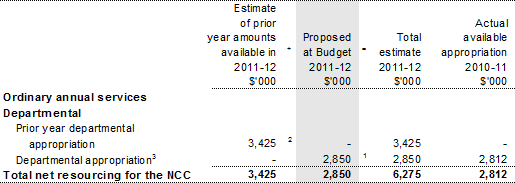
1. Appropriation Bill (No. 1) 2011-12.
2. Estimated adjusted balance carried from previous year for annual appropriations.
3. Includes $0.04 million in 2011-12 for the departmental capital budget (also refer to Table 3.2.5).
Third party payments from and on behalf of other agencies

Note: The ACCC provides financial services to the NCC and has drawdown access to manage the NCC's finances.
1.3 Budget measures
Budget measures relating to NCC are detailed in Budget Paper No. 2, Budget Measures 2011-12 and are summarised below.
Table 1.2: National Competition Council 2011-12 Budget measures

Prepared on a government finance statistics (fiscal) basis.
Section 2: Outcomes and performance information
2.1 Outcomes and performance information
Government outcomes are the intended results, impacts or consequences of actions by the Government on the Australian community. Commonwealth programs are the primary vehicle by which government agencies achieve the intended results of their outcome statements. Agencies are required to identify the programs which contribute to Government outcomes over the budget and forward years.
The NCC's outcome is described below, specifying the strategy, program, objective, deliverables and key performance indicators used to assess and monitor the performance of the NCC.
Outcome 1: Competition in markets that are dependent on access to nationally significant monopoly infrastructure, through recommendations and decisions promoting the efficient operation of, use of and investment in infrastructure
Outcome 1 strategy
To achieve Outcome 1 the NCC will provide comprehensive, objective, timely and transparent recommendations and decisions that accord with the relevant law (including time limits) and good regulatory practice.
Pursuant to the CCA, the NCC provides recommendations to Ministers on applications for the declaration of services provided by monopoly infrastructure facilities and on the certification of state and territory access regimes.
Pursuant to the NGL, the NCC provides recommendations to Ministers on the coverage of natural gas pipeline systems and on price regulation and greenfields incentives, and makes determinations on the form of regulation and on the classification of natural gas pipeline systems.
Governments through the Council of Australian Governments agreed under the Competition and Infrastructure Reform Agreement 2006 to submit applications for the certification of their existing access regimes and for the certification of energy access regimes by the end of 2010. They also undertook to achieve certification of any new access regimes as soon as practicable.
Governments submitted applications for the certification of all existing operational access regimes except one by the end of 2010. Applications for the certification of energy access regimes are yet to be submitted. In 2011-12, the NCC will liaise with Government applicants to assist them in formulating remaining certification applications and ensuring applications are properly considered and certified as appropriate.
The NCC will continue to improve its processes and the structure of its recommendation reports and decisions. It will also continue to develop its published guidelines and other information in relation to access regulation to ensure these remain up-to-date.
Outcome expense statement
Table 2.1 provides an overview of the total expenses for Outcome 1.
Table 2.1: Budgeted expenses for Outcome 1
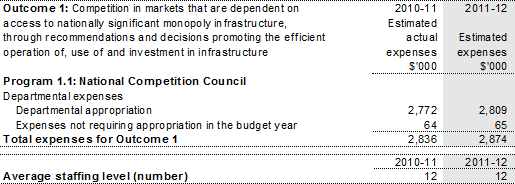
Contributions to Outcome 1
Program 1.1: National Competition Council
Program objective
The NCC's objective is to provide advice to governments and make decisions on infrastructure access issues that accord with statutory requirements (including time limits) and good regulatory practice, and ensuring that advice meets requirements of decision making Ministers, such that Australia achieves a consistent approach to access regulation that promotes the efficient operation of, use of and investment in infrastructure thereby promoting effective competition.
Program expenses
There are no significant changes to estimates across the forward years.
Table 2.2: Program expenses

Program deliverables
The NCC has the following deliverables:
- makes recommendations to Ministers pursuant to Part IIIA of the CCA in relation to applications for the declaration of services provided by monopoly infrastructure and the certification of state and territory access regimes;
- makes recommendations to Ministers pursuant to the NGL relating to the coverage of natural gas pipelines and on price regulation and greenfields incentives;
- makes decisions pursuant to the NGL relating to the form of regulation and classification of natural gas pipelines; and
- advises the Parliament on the operation of the National Access Regime in accordance with section 29O(2) of the CCA.
Program key performance indicators
The NCC has the following key performance indicators:
- recommendations on declaration applications made within statutory time limits (consideration period of 180 days) and meet advice requirements of Ministers;
- recommendations on certification applications made within statutory time limits (consideration period of 180 days) and meet advice requirements of Ministers;
- recommendations and decisions under the NGL made within specified time limits and recommendations under the NGL meet advice requirements of Ministers;
- accessible information on all access regulation matters for which the NCC is responsible is provided on the NCC website;
- up-to-date and informative guidelines on all the NCC's areas of responsibility are maintained on the NCC website;
- case law developments, legislative amendments and developments in the NCC's processes or policies are reflected in the NCC's information resources within 30 days; and
- the NCC's Annual Report to the Parliament includes a comprehensive report that meets the requirements of section 29O(2) of the CCA and is provided within 60 days of the end of the financial year.
Section 3: Explanatory tables and budgeted financial statements
Section 3 presents explanatory tables and budgeted financial statements which provide a comprehensive snapshot of agency finances for the budget year 2011-12. It explains how budget plans are incorporated into the financial statements and provides further details of the reconciliation between appropriations and program expenses, movements in administered funds, special accounts and government Indigenous expenditure.
3.1 Explanatory tables
3.1.1 Movement of administered funds between years
The NCC does not have any administered funds.
3.1.2 Special accounts
Special accounts provide a means to set aside and record amounts used for specified purposes. Special accounts can be created by a Finance Minister's Determination under the Financial Management and Accountability Act 1997 (FMA Act) or under separate enabling legislation. Table 3.1.2 shows the expected additions (receipts) and reductions (payments) for each account used by the NCC.
Table 3.1.2: Estimate of special account cash flows and balances

3.1.3 Australian Government Indigenous Expenditure
The NCC does not have any Australian Government Indigenous Expenditure.
3.2 Budgeted financial statements
3.2.1 Differences in agency resourcing and financial statements
There are no differences between agency resourcing and financial statements.
3.2.2 Analysis of budgeted financial statements
Budgeted departmental income statement
The NCC is budgeting for a break even result for 2011-12 and the forward estimates. This break even result will occur after adding back non-appropriated depreciation and amortisation expenses under the new net cash appropriation arrangements which were initiated in the 2010-11 Budget.
Operating revenues
Total NCC revenue in 2011-12 is estimated to be $2.8 million.
Operating expenses
Total expenses in 2011-12 are estimated to be $2.8 million.
Budgeted departmental balance sheet
In 2011-12 the NCC's equity position will be positive $4.0 million.
Assets
The NCC's assets are predominantly financial assets consisting of other receivables and cash. The non-financial assets include leasehold improvements and plant and equipment assets.
Liabilities
The NCC's liabilities are mainly employee entitlements. There is no significant movement in total liabilities from 2010-11.
3.2.3 Budgeted financial statements tables
Table 3.2.1: Budgeted departmental comprehensive income statement
(for the period ended 30 June)
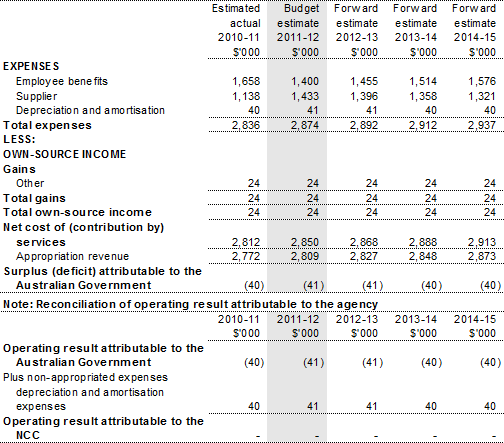
Prepared on Australian Accounting Standards basis.
Table 3.2.2: Budgeted departmental balance sheet
(as at 30 June)
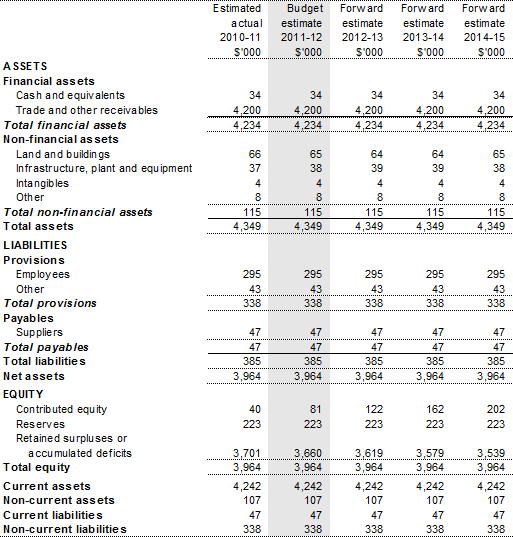
Prepared on Australian Accounting Standards basis.
Table 3.2.3: Budgeted departmental statement of cash flows
(for the period ended 30 June)
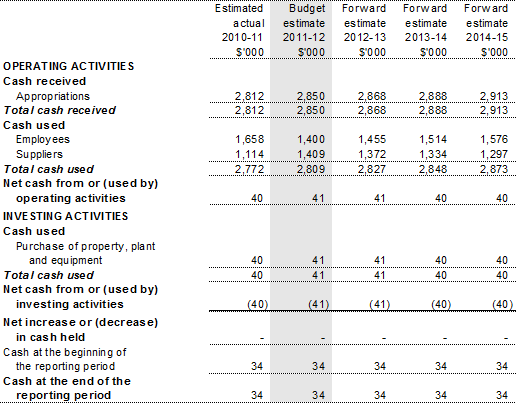
Prepared on Australian Accounting Standards basis.
Table 3.2.4: Departmental statement of changes in equity — summary of
movement (budget year 2011-12)
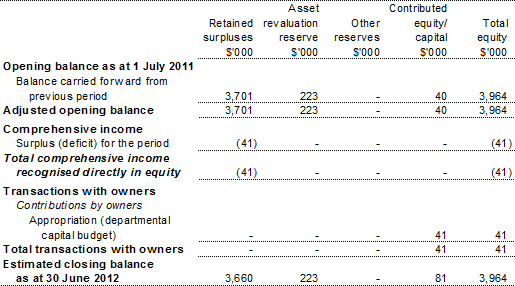
Prepared on Australian Accounting Standards basis.
Table 3.2.5: Departmental capital budget (DCB) statement
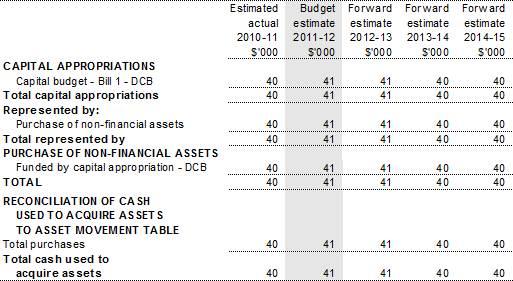
Prepared on Australian accounting standards basis.
Table 3.2.6: Statement of asset movements — departmental
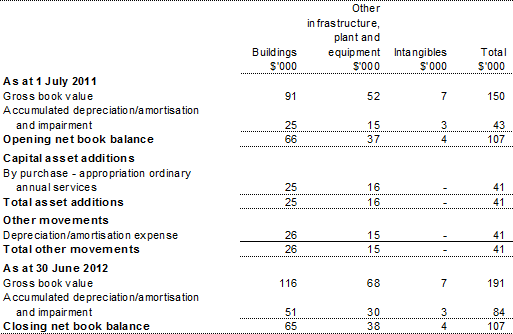
Prepared on Australian accounting standards basis.
3.2.4 Notes to the financial statements
The financial statements have been prepared on an Australian Accounting Standards basis.